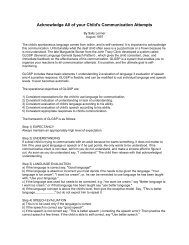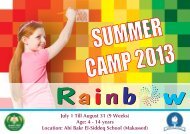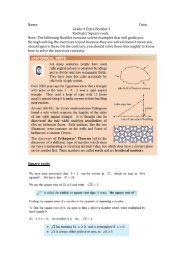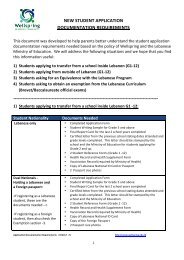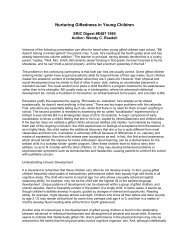Helping Your Highly Gifted Child - Wellspring Learning Community
Helping Your Highly Gifted Child - Wellspring Learning Community
Helping Your Highly Gifted Child - Wellspring Learning Community
Create successful ePaper yourself
Turn your PDF publications into a flip-book with our unique Google optimized e-Paper software.
logistical problems such as scheduling and transportation, but is often more satisfactory than grade<br />
skipping because the child associates at least part of the time with age peers.<br />
When the School Will Not Change<br />
When parents approach teachers and administrators with information and documentation, in a spirit of<br />
cooperation instead of confrontation, offering suggestions and help instead of attacking, some positive<br />
changes in normal methods usually result. Sometimes, however, schools refuse to make changes for one<br />
child. When this happens, parents have few choices. One is to move to a school system that will make<br />
changes. Another is home schooling.<br />
For many highly gifted children home schooling is a nearly ideal solution to the problem of fit. Instead of<br />
laboriously altering ready-made programs, parents can tailor an education precisely to the child's needs.<br />
Clubs, sports, scouting, and other activities supply social interaction with other children while parents<br />
serve as teachers or facilitators or engage tutors or mentors in various subject areas.<br />
Home schooling is seldom an easy choice. In some districts it is either illegal or beset with regulations<br />
that make it almost as rigid as classroom schooling. When both parents or the single resident parent must<br />
work, it may be impossible. Some parents and children find the level of togetherness stifling, while others<br />
cannot avoid pushing and demanding too much. However, home schooling may be a positive choice for<br />
many families. Many children move surprisingly smoothly from home schooling in the early years into high<br />
school or college when their intellectual needs outgrow the home environment. One of the major benefits<br />
to education at home is the maintenance of self- esteem, which is highly problematic in a school<br />
environment.<br />
Social/Emotional Needs<br />
In the movie E.T. there was something heartrending in the small alien's attempts to "phone home," in his<br />
constant longing for others of his kind despite the loving concern of the family who cared for him. <strong>Highly</strong><br />
gifted children endure some of that same pain. It is hard for them to find kindred spirits, hard for them to<br />
feel they fit into the only world they know.<br />
<strong>Highly</strong> gifted children may have trouble establishing fulfilling friendships with people of their own age<br />
when there are few or no other highly gifted children with whom to interact. As a high school student told<br />
his mother, "I can be that part of myself that is like my classmates, and we get along fine. But, there's no<br />
one I can share the rest of me with, no one who understands what means the most to me." For most<br />
highly gifted children, social relationships with age peers necessitate a constant monitoring of thoughts,<br />
words, and behavior.<br />
One of the greatest benefits of the talent searches proliferating in colleges across the country is the<br />
chance for highly gifted children to spend time with others like themselves. For 3 weeks in the summer,<br />
children who qualify (by scoring high enough on the SAT or ACT in the seventh grade or earlier) attend<br />
class on a college campus with other highly gifted children. Rather than feeling like oddballs, they<br />
suddenly feel normal. Lifelong friendships may form in a matter of days. Many summer program<br />
participants consider the social interaction as valuable as the classes.<br />
What else can you do to help highly gifted children find friends It helps children to understand that there<br />
are different types of friends. They may play baseball, ride bikes, and watch TV with one person, talk<br />
about books or movies with another, and play chess or discuss astronomy with another. Some of these<br />
friends may be their own age, some may be younger, or more often, older. Only in school is it suggested<br />
that people must be within a few months of each other in age to form meaningful relationships.<br />
Conclusion



